In preparation for teaching a literature course in the 1950s, René Girard reread some of the classic novels. In the process he realized that the novelists had had profound insights into aspects of the human condition and that to a large degree, they were the same insights. Not only that: they all ended the same way with the despised central protagonist recognized by the author, finally, as an aspect of himself. Thus, all the great novels end with a moment of transcendent self-revelation. This claim is certainly immensely provocative and intriguing.
Girard began his exploration of these novelistic insights in Deceit, Desire and the Novel.¹ The key insight is the role of imitation in human life. It accounts for the ability to read these words, cross a street without getting hit by cars and practically everything else humans do. In other words, it is a great boon. However, Girard claims, when imitating others is combined with a belief that God is dead the thwarted desire for the transcendent takes a nasty turn.

Saint Augustine
What is the transcendent? It is God, heaven, perfection, eternal life, Plato’s Forms, salvation, ultimate reality, enlightenment and supreme happiness. The desire for the transcendent is a desire for some ultimate meaning that will unequivocally give life purpose. The trouble is that if it is imagined that heaven on earth is the only kind of heaven that can exist, vertical transcendence gives way to attempts at horizontal transcendence leading to things like Pol Pot in Cambodia, trying to force reality into the perfection it is imagined is possible here below.
The desire for transcendental meaning exists within each person. Without a divine object, the desire remains and a non-divine, non-transcendent object will be sought.
St. Augustine had a related insight. Augustine claimed that objects, people and money are all good and desirable. However, it is necessary not to try to extract more happiness from these items than they can deliver. Human greed exists because human desire knows no limit. Augustine argues that the only infinite entity is God. Once a person looks to God for his spiritual fulfillment, he is capable of moderating his desire for objects, money and people. Without God, people become monstrous; throwing people, objects and money into an infinite pit and are thus insatiable.
While infinite desire can seem like a curse, it is actually the connection with God; with the infinite. It forces people to keep searching until the main object of desire is found. Girard’s analysis explains in what horrible ways the imagined “death of God” has contributed to human misery.
Feuerbach
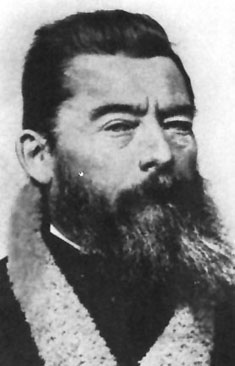
Ludwig Andreas von Feuerbach (b. 1804 d. 1872)
Karl Marx claimed that he took Hegel and stood him on his head. Instead of history being the progress of Absolute Spirit towards its true nature, freedom, Marx claimed that history is about the progress of man’s freedom here on Earth. Marx said that to reach his philosophy he had to cross the fiery brook – the translation of Feuerbach’s name. Feuerbach claimed that there is no God. God is just a projection of man’s best qualities on to an imaginary being. That then leaves man with all the remaining bad qualities. What needs to be done, Feuerbach argued, is to reclaim the good qualities that belong to man to realize his true human dignity, instead of groveling to an imaginary deity. “In the consciousness of the infinite, the conscious subject has for his object the infinity of his own nature.” This paves the way for Marx’s utopian fantasies.
The good qualities will include benevolence, justice, wisdom, and most significantly for Girard’s thesis, autonomy – “God alone is the being who acts of himself.” For Feuerbach, even omnipotence, omniscience and ultimate goodness seem to be qualities human beings are capable of attaining – unlimited physical, moral and intellectual capacities.
The Enlightenment and the Romantics
The Enlightenment figures imagined that human and social progress would be possible if a strongly rational approach to life was taken. With the help of science, superstitions like the belief in God, belonging to the childhood of mankind, would be abolished and society could be reformed following a rational pattern. Enter social engineering. Many Enlightenment figures conceived of humans as rational egoists, i.e., smart and immoral. As such, people have no choice but to act in their own self-interests, narrowly conceived. This disgusting and repulsive notion is condemned by the narrator of Dostoevsky’s “Notes from Underground,” himself a deeply troubled individual caught up in mimetic desire.
The Romantics hated this emphasis on reason and science. They felt that feelings and Spirit, a deracinated Christian God, are central to human existence and that Kant’s disembodied intelligence with no links to the empirical or transcendent realms was revolting.
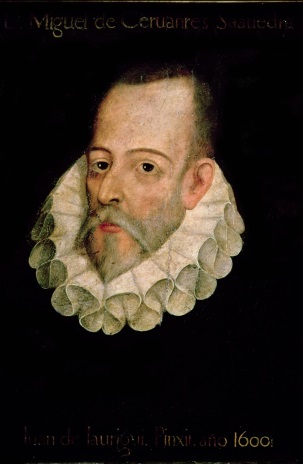
Portrait of Miguel de Cervantes y Saavedra (1547-1615) 1600 (oil on panel) by Jauregui y Aguilar, Juan de (c.1566-1641)
From some of the Romantics comes the notion that human greatness is measured by a person’s strength of feeling and by his originality. Regular people’s feelings and desires are weak, anemic and mimetic – pale copies of what others feel and desire. The Romantic hero’s feelings are profound and original to him. In this way, the Romantic hero is self-sufficient and original, bearing the qualities of God. In reality, humans are dependent and created. Only God is autonomous and creative in a profound sense.
Beethoven, the original wild-haired self-marketing “genius” embodies this way of thinking. Haydn and Bach had patrons. Beethoven had to sell his compositions and fostered a self-mystique; possibly playing up his deafness for this purpose. Lord Byron too seemed to promote the notion that he felt more strongly and deeply than ordinary folk.
Girard claims that these god fantasies set the scene for resentment, hatred and envy; ratcheting up the miseries already inherent in the human condition.
Pride has always been a human temptation, but this Romantic ethos takes it to new heights, making us competitors with God.
Cervantes is pre-Romantic, and so is his Don Quixote. Don Quixote explicitly admires Amadis of Gaul, his paradigm Knight Errant – a wandering and solitary knight, which would be militarily useless and thus suicidal. Don Quixote has given up the human prerogative to choose what he desires, to his hero. This is called “external mediation” by Girard. Amadis of Gaul is the mediator, or model. Don Quixote cannot enter into rivalry with Amadis of Gaul who is fictional. The former has been corrupted by books of chivalry and fantasy, seeming to believe that they are accurate and literal documents.
Madame Bovary is half Romantic, half not. She desires to feel strongly, but has no ambition to be original. She has been corrupted by romances. She openly admires the remnants of French aristocracy and the high life of Paris. Again, she cannot actually compete. She cannot become an aristocrat and she lives a long way from Paris. Her admiration, being explicit, and of a model with whom competition cannot occur, still constitutes external mediation.
For Girard, Don Quixote and Madame Bovary are both mad, but they are less mad than contemporary people, because they are aware of and acknowledge their mimesis; copying the desires of others.
The False Promise
Modern people have inherited the Romantic delusion and are in competition with God. Moderns think they ought to be self-sufficient, autonomous and original. They rarely openly admit to copying other people; pride does not permit it. But when a person looks within himself, he finds no hint of self-sufficiency, autonomy or originality. What is found is neediness, weakness and ignorance – a nothing; an abyss. People find their own mortality and limitedness.
The vaniteux for Girard is the person too vain to acknowledge the role of imitation in his life and so he remains blind to this paramount fact about human existence.
In the old days God was admired and people imitated divine models. This was vertical transcendency. Today, the transcendent is rejected, but the same old tendency to imitate is there and the same desire for transcendence is there. But there are no gods anymore. With democratic egalitarianism, even social hierarchies are denied. This leads to deviated or horizontal transcendence; a kind of sideways lurch. Natural and proper desires are perverted and directed at other people who now become the objects of spiritual desire.
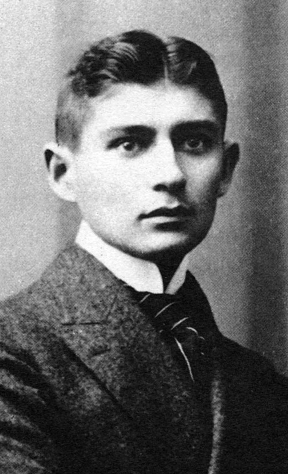
Franz Kafka (b. 1883 d. 1924)
The doctrine of original sin said that man was fallen and corrupt. Unable to help himself, with God’s grace, he may overcome human weakness and become whole. No other human was truly admirable. All were in the same boat. Redemption was sought from God.
Romantic hubris replaces this. Pride suggests God is not needed. Pride encourages the thought “I am self-sufficient.” But then it is found that this is not the case. A person’s self-conception is in fact derived from the responses elicited from the people around him. People have social needs and a desire to interact. Each of person spent years dependent on the exertions and love of his parents.
There is a terrible disjunction between the false promise and reality. Desperately looking around, other people seem to be doing OK. They fit in. It is only I, it seems, who has been excluded from the divine inheritance. I and I alone am the one the fairy godmother overlooked. They all look like they might be self-sufficient and autonomous. Pride turns a person outward. Envious and resentful of what they possess, a person may seek to befriend them. Their being may be sought. The narrator from Notes from Underground writes a letter to the arrogant officer he admires that mixes hatred with a desire to merge with him; “with your brawn and my intelligence, think how great we could be,” he writes.
It is imagined that it is the Other who possesses the divine inheritance. Their being is wanted. But it is not possible to get it; they already have it. They seem to stand at the gates of heaven; both showing us paradise and forbidding entry. They are hated. They are loved; and this is the essence of resentment. It is impossible to be them; they already fill that spot. They are the model, the obstacle and the rival.

Fyodor Mikhailovich Dostoyevsky (b. 1821 d. 1881)
They are invited to the feast. I am left out. This is the position of the country man in Kafka’s Before the Law who is prevented from entering the premises of the law by a forbidding looking sentry who tells him that if the man should make it past him there is a still more forbidding sentry and so on. The country man waits there his whole life until old age takes him, having given everything away in his attempt to bribe the sentry. At the last moment a golden light appears through the crack at the bottom of the door which the old man’s dim eyes can barely see just as he dies after hearing that this door was in fact built for him and him alone. That’s the tantalizing experience of seemingly having paradise right there; simultaneously proffered and withdrawn.
Pride hides all this. Internal mediation means direct competition with the model. But it is deemed humiliating to have a model and thus not to be godlike; self-sufficient and original. Thus the role of mimetic desire remains hidden. Egalitarianism means that everyone is a potential rival. Vanity turns attention towards the outside to find that which we do not possess; autonomy.
This is the false promise; the promise of godliness. Being excluded from the divine inheritance, a person feels self-hatred. How is it that I alone have been left out? The self-hatred leads to hatred of others; of resentment. Resentment combines hatred and admiration. A person is admired for being seemingly god-like and simultaneously hated for possessing something the other person cannot attain.
With original sin and the real God in the heavens, it is at least possible to commiserate with fellow sufferers, and to hope for salvation. With the Romantic hero as the model, each person is alone in his imperfection, in his finitude and in his emptiness. In The Possessed (The Devils) by Dostoevsky, one character says men shall be as gods to each other. This is supposed to represent heaven on earth and optimism. Instead, it is the entre to hell.
In The Raw Youth there is a character called Dolgorouki. He is a literal bastard. However, his name is associated with royalty and everyone he meets imagines that he is a prince. The difference between perception and reality is particularly painful to him. Girard says we are all Dolgorouki; a prince to others and a bastard to ourselves.
Snobbery is particularly pathetic. Again, the snob will be transformed, he thinks, by being accepted by his social superiors. Now, this is ridiculous. If someone is truly aristocratic, a person cannot become aristocratic merely by being accepted by them. In an aristocracy, status is conferred by a social rank that can only be changed when a title is inherited due to the death of a relative.
Snobbery is only possible where there is actual equality. The social differences are only imaginary. The snob idolizes people who are fundamentally his equals (this goes for all idolization vis-à-vis internal mediation). The more of a snob a person is, the more he condemns it in other people. If someone is great at detecting snobbery, if he understands it, if he gets every nuance, it is because he is a snob himself. The sickest see the sickness in others the best. People attack the attributes found in other people because they possess those attributes ourselves. It is imagined that those qualities can be eradicated by “killing” them in others in the phenomenon called “projection.”
The Neo-Romantic Hero
The Neo-Romantics are more sophisticated. They recognize that it is not possible to prove originality and superiority by the strength of feelings. They realize that feelings are strongest when other people are being copied; when desires are mimetic. For instance, romantic feelings are strongest when there is a rival. The desire, real or imagined, that another person seems to possess is copied. The girl or boy is desirable because she or he is desired.
But the Neo-Romantics are still after spontaneity, originality, etc.. It is just that the Neo-Romantic hero is he who feels the least. Examples include Roquentin from Nausea by Sartre, or Mersault in The Stranger by Camus. Girard calls this new model the somnambulist hero – sleepwalking his way through life, feeling nothing. This hero knows that all desire is metaphysical, that it is a desire for God. His lack of desire is not explained. Apparently it is spontaneous. A gift from God! Girard contrasts this with the painful ordeal undergone by saints in the quest for self-mastery and renunciation. The saints’ lack of desire is only achieved by self-conquest. The somnambulist hero has undergone no such ordeal, and has demonstrated no such strength of character.

Albert Camus (b 1913 d. 1960)
The new hero desires his own nothingness. He sees the abyss inside himself and embraces it.
Girard comments that this new model is just another perversion of vertical transcendency. It has just become even more devious. The writer pretends he does not care about his reader. He writes horribly with unsympathetic characters. See how little I care? But, he wants to be admired for his lack of desire – he still desires. He turns his back on us, but looks out of the corner of his eye to see if the reader can see how little he cares. Publishing is an embarrassment to him; an admission that he cares. The aristocrats had servants who stole their manuscripts and had them published against their will; an admired writer despite his best intentions. Heaven!
All deviated transcendency tends toward death. When the desire to be accepted or loved is rejected, this confirms the assessment that the Other is God. The supplicant is not worthy to gather the crumbs from under the adored one’s table. Her rejection proves this. That means there is a tendency to be attracted to all that frustrates; to all that rejects. Proust’s characters are obsessed by women who want nothing to do with them. Proust’s snob wants to be accepted by his social betters; where his wealth, charm and intelligence is useless. His characters are drawn to stupid young women who are unable to appreciate what he has to offer.
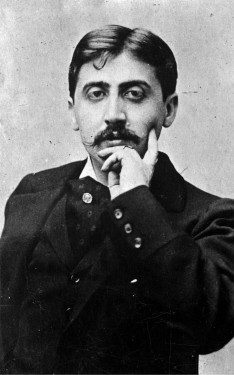
Valentin Louis Georges Eugène Marcel Proust (b. 1871 d. 1922)
This all leads to death. To be attracted to the insensitive is to be attracted to things, inanimate objects, machines. Dead things fascinate because they seem to look into souls and see the truth; this person is not worthy; this person is excluded from the divine inheritance. In worshipping stupidity and insensitivity death is admired because nothing is more insensitive than the dead, the inanimate. A rock seems self-satisfied, desiring nothing and thus the perfect model.
The false promise leads to sadomasochism. The admired one is the sadist; the admirer, the masochist. It is mere chance which role someone assumes. He who desires first loses in this pathological game of love. This is because both the sadist and the masochist are filled with self-hatred for not being divine. Self-contempt means contempt for the admirer. The beloved knows what she is like. To admire her, is to truly be a fool. Yet, the inevitable rejection makes the beloved even more divine-seeming. The more attracted, the more desirous, the more firmly the lover is rejected. “Get away from me you pathetic worm. I don’t want to join a club that will have me for a member.”
Kirillov: the Apogee
In Dostoevsky’s The Possessed/The Devils one fascinating chapter concerns the character Kirillov. He knows that the biggest drawing card of religion is the promise of immortality. If immortality is a lie, then Christianity and all other religion is evil. It must be stopped. Kirillov plans to be a literal Anti-Christ. He will save humanity from its fear of death and by doing so, he will rob God of His power. The notion of God, real or not, will lose its attraction. Kirillov plans to start a new era for mankind by killing himself, but not in fear. Instead of running away from mankind’s nothingness and racing to embrace the Other, he will embrace his own nothingness; his finitude. In imitation of Kirillov, people will learn to love their weakest point, their mortality. By willingly and fearlessly killing himself, Kirillov will save man from immortality and bequeath eternal death; the exact opposite of Christ. Ironically in this misguided desire, Kirillov is more saintly, more of a true believer, than most theists. In death, people will find freedom.
In wanting death, Kirillov rejects God. But seeking to supplant God is effectively to wish to be God; to take His place. Kirillov is God’s rival. If God is the rival, then He is the mediator. Kirillov is imitating God after all, which of course is what is happening when he imitates Christ. The closer he gets to death, the closer he gets to God, to his model and mediator – the exact opposite of his intentions. But the mediator is also the obstacle, so divinity is denied him.
If he ends by killing himself it is in scorn of himself and hatred of his finiteness, like other men. His suicide is an ordinary suicide. In Kirillov the oscillation between pride and shame, those two polarities of the underground consciousness, is constantly present, but in him it is reduced to a single movement of extraordinary amplitude. Thus Kirillov is the supreme victim of metaphysical desire.²
Kirillov is trying to put an end to vertical desires but in the process he demonstrates the supreme deviated transcendency and the most ludicrous. He is attempting to steal God’s actual divinity in the ultimate act of pride and thus shame at his own inadequacy. He wants God’s infinity because he despises his own finitude.
Like all proud people he covets Another’s divinity and he becomes the diabolic rival of Christ. In this supreme desire the analogies between vertical and deviated transcendency are clearer than ever.³
Kirillov is reminiscent of certain famous atheist proselytizers – more fascinated by God than most believers.
The crucial fact of human existence is mimetic nature. The main choice is to choose what and whom to imitate. Will it be an earthly or a divine model? What is not possible is to quell the desire for transcendence. This desire will find another outlet and seek an alternative – it will not simply cease. Once a transcendent heaven is abolished, the tendency is to try to create heaven on earth. This is precisely what many nineteenth centuries thinkers were hoping for. Unfortunately, since human beings are imperfect, attempts to squeeze them into perfection have led to mass murder and misery, and ever thus it will be.
 Adj. Prof. Richard Cocks teaches philosophy at SUNY Oswego. Originally from Christchurch, New Zealand, he is presently based in the United States. Dr. Cocks is an editor and regular contributor at the Orthosphere and has been published at The Brussels Journal, People of Shambhala, The John William Pope Center for Higher Educational Policy and the University Bookman.
Adj. Prof. Richard Cocks teaches philosophy at SUNY Oswego. Originally from Christchurch, New Zealand, he is presently based in the United States. Dr. Cocks is an editor and regular contributor at the Orthosphere and has been published at The Brussels Journal, People of Shambhala, The John William Pope Center for Higher Educational Policy and the University Bookman.
Endnotes:
- René Girard, Deceit, Desire and the Novel (John Hopkins University Press, 1976).
- Ibid. p. 227.
- Ibid.
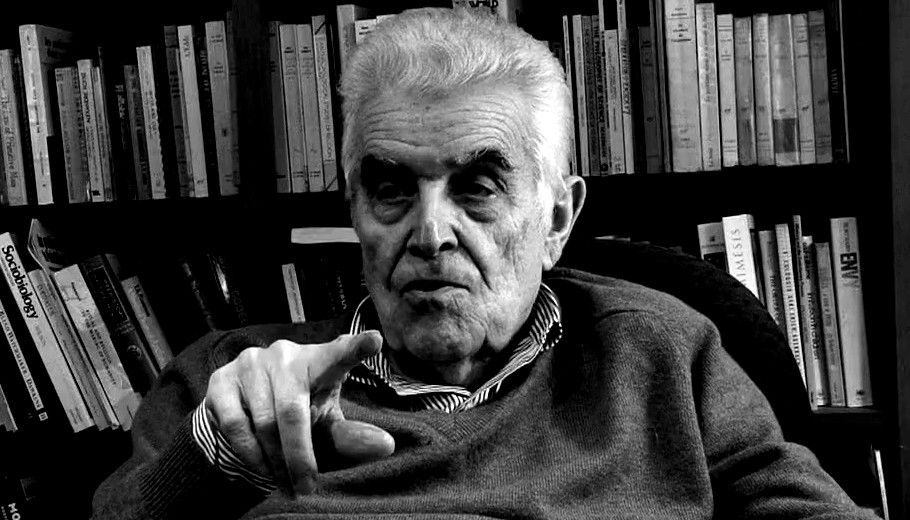


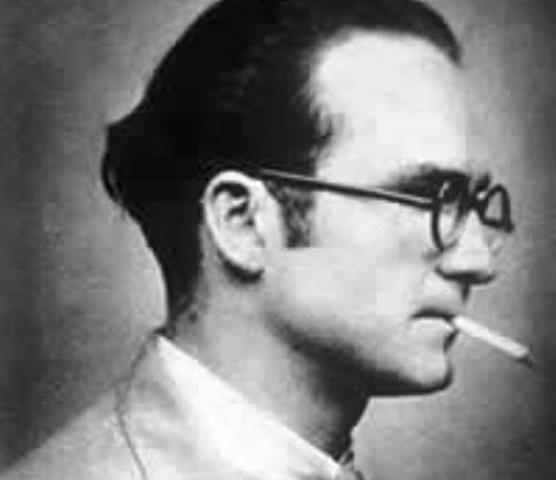

Reblogged this on Seeing the Form and commented:
From Richard Cocks, Orthosphere contributor.